A snuff film, snuff movie, or snuff video is a theoretical type of film, produced for profit or financial gain, that shows, or purports to show, scenes of actual homicide. The victims are supposedly typically lured to their murders by false pretenses and their murder is then filmed and the video depicting it is sold to buyers.

Cannibal Holocaust is a 1980 Italian cannibal film directed by Ruggero Deodato and written by Gianfranco Clerici. It stars Robert Kerman as Harold Monroe, an anthropologist who leads a rescue team into the Amazon rainforest to locate a crew of filmmakers that have gone missing while filming a documentary on local cannibal tribes.
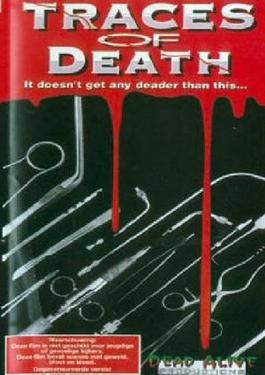
Traces of Death is a 1993 American mondo film that consists of various scenes of stock footage depicting death and real scenes of violence.
Cannibal films, alternatively known as the cannibal genre or the cannibal boom, are a subgenre of horror films made predominantly by Italian filmmakers during the 1970s and 1980s. This subgenre is a collection of graphically violent movies that usually depict cannibalism by primitive, Stone Age natives deep within the Asian or South American rainforests. While cannibalism is the uniting feature of these films, the general emphasis focuses on various forms of shocking, realistic and graphic violence, typically including torture, rape and genuine cruelty to animals. This subject matter was often used as the main advertising draw of cannibal films in combination with exaggerated or sensational claims regarding the films' reputations.

Gualtiero Jacopetti was an Italian documentary film director. With Paolo Cavara and Franco Prosperi, he is considered the originator of mondo films, also called "shockumentaries".

Goodbye Uncle Tom is a 1971 Italian mondo docudrama co-directed and co-written by Gualtiero Jacopetti and Franco Prosperi with music by Riz Ortolani. Based on true events, the filmmakers explore antebellum America, using period documents to examine in graphic detail the racist ideology and degrading conditions faced by Africans under slavery. Due to the use of published documents and materials from the public record, it is labeled a documentary, though all footage is re-staged using actors.

RizieroOrtolani was an Italian composer, conductor, and orchestrator, predominantly of film scores. He scored over 200 films and television programs between 1955 and 2014, with a career spanning over fifty years.

Mondo Topless is a 1966 pseudo-documentary directed by Russ Meyer, featuring Babette Bardot and Lorna Maitland among others. It was Meyer's first color film following a string of black and white "roughie nudies", including Faster, Pussycat! Kill! Kill! While a straightforward sexploitation film, the film owes some debt to the French New Wave and cinéma vérité traditions, and is known to some under the titles Mondo Girls and Mondo Top.
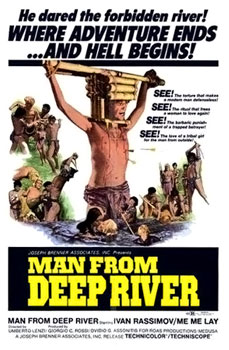
Il paese del sesso selvaggio, also known as Man From Deep River, Deep River Savages and Sacrifice!, is a 1972 Italian cannibal exploitation film directed by Umberto Lenzi and starring Ivan Rassimov, Me Me Lai and Pratitsak Singhara. It is perhaps best known for starting the "cannibal boom" of Italian exploitation cinema during the late 1970s and early 1980s.
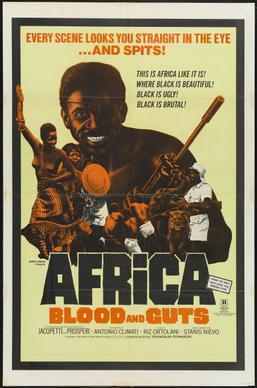
Africa Addio is a 1966 Italian mondo documentary film co-directed, co-edited and co-written by Gualtiero Jacopetti and Franco E. Prosperi with music by Riz Ortolani. Jacopetti and Prosperi had gained fame as the directors of Mondo Cane in 1962.

Ultime grida dalla savana, also known as by its English title Savage Man Savage Beast, is a 1975 Italian mondo documentary film co-produced, co-written, co-edited and co-directed by Antonio Climati and Mario Morra. Filmed all around the world, its central theme focuses on hunting and the interaction between man and animal. Like many mondo films, the filmmakers claim to document real, bizarre and violent behavior and customs, although some scenes were actually staged. It is narrated by the Italian actor and popular dubber Giuseppe Rinaldi and the text was written by Italian novelist Alberto Moravia.
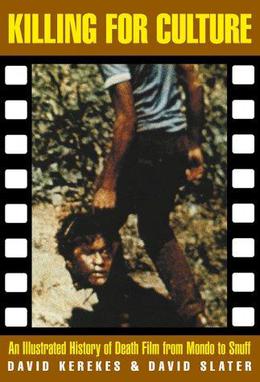
Killing for Culture: An Illustrated History of Death Film from Mondo to Snuff (1994) is the first book in the Creation Cinema series and deals with death in film and media.

Dolce e selvaggio is a 1983 Italian mondo film directed by Antonio Climati and Mario Morra. The title "Sweet and Savage" refers to the juxtaposition of pleasant 'sweet' and violent 'savage' imagery within the film. It is narrated by the producer and long-time Mondo film director Franco Prosperi.

Mondo Cane is a 1962 Italian mondo documentary film and directed by the trio of Gualtiero Jacopetti, Paolo Cavara, and Franco E. Prosperi, with narration by Stefano Sibaldi. The film consists of a series of travelogue scenes that provide glimpses into cultural practices around the world with the intention to shock or surprise Western film audiences. These scenes are presented with little continuity, as they are intended as a kaleidoscopic display of shocking content rather than presenting a structured argument. Despite its claims of genuine documentation, certain scenes are either staged or creatively manipulated to enhance this effect.
Paolo Cavara was an Italian screenwriter and film director. He is best known for collaborating with Gualtiero Jacopetti and Franco E. Prosperi on the 1962 mondo film Mondo Cane, and for directing the fiction film The Wild Eye (1967) and two giallo films, Black Belly of the Tarantula (1971) and Plot of Fear (1976).

Mondo candido is a 1975 Italian black comedy film by Mondo directors Gualtiero Jacopetti and Franco Prosperi. It is a liberal adaptation of Voltaire's 1759 novel Candide.

Women of the World is a 1963 Italian mondo film, also described as a "shockumentary", written and directed by filmmakers Gualtiero Jacopetti, Paolo Cavara, and Franco Prosperi. It was rushed into release on 30 January, following the international box-office success achieved by its predecessor, the initial mondo film, Mondo Cane, which premiered in Italy ten months earlier, 30 March 1962. The English language print was narrated by Peter Ustinov.
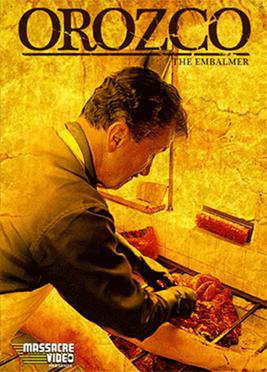
Orozco the Embalmer is a 2001 Spanish-language Japanese-Colombian mondo film directed by Kiyotaka Tsurisaki. It follows a Colombian embalmer named Froilan Orozco Duarte, who is shown living in El Cartucho, an impoverished and crime-ridden area of Bogotá, Colombia, where the homicide rate is high and corpses can be seen on the streets.
Antonio Climati was an Italian cinematographer, filmmaker and film editor.
Franco E. Prosperi is a journalist and marine scientist who became a documentary director and producer. He is best known for his lasting collaboration with Gualtiero Jacopetti in the mondo film genre. His only fictional film was Wild Beasts.













